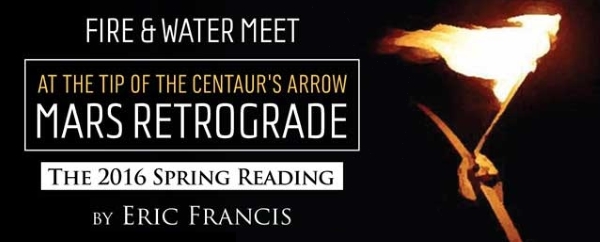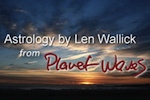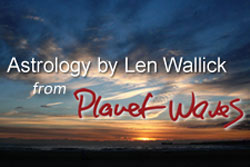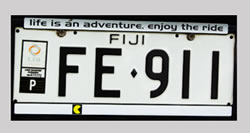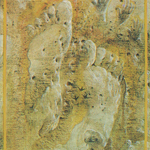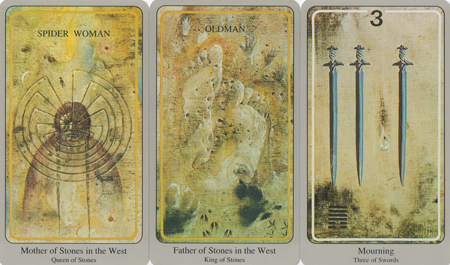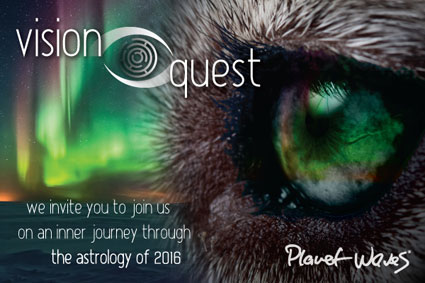Occasionally in this forum I will begin to articulate new insights and ideas — this piece is one of them. I offer that at the top, dear reader, in acknowledgment of the fact that these thoughts are works in progress and in invitation to discuss the themes in the comments.
Although I’ve dabbled in more “magical” practices, such as Golden Dawn and various Pagan traditions, I realized a while back that I’m not really a practitioner of magic, be it ceremonial or witchy.
There are subtleties to be worked out there, as I definitely use ritual frequently — often in the intention-setting sense — but I have strayed away from more active will-enforcing-supporting pursuits. One reason of several is that I just don’t think I’m any good at that kind of magic — and it’s not anything I aspire to. Another is that it’s just felt too loaded. A break in my understanding of this inner conflict came about a year ago as I was contemplating it in a session with my therapist.
As I pondered my aversions to ritual magic, my therapist pointed out the difference between the magical path and the mystical path. We were nearing the end of the session and his resulting over-generalization was that the magical path is about asserting one’s will whereas the mystical path was about radical acceptance of all that is or radical retreat from all that is. Although I knew the dynamics were more complex, the statement gave me a good starting point. I recognized myself as being more on the mystical path than the magical, with some overlap — a designation that became startlingly more clear to me this past weekend.
I was sitting in a conversation that was all over the occult-y, magical and worldview map, when the concept of using magic came up in a specific context that I was was very uncomfortable with. A paraphrase of the basic example given was that if, say, an individual is suffering at the hands of an abuser, lives with some kind of physical disability, and is unable to realistically get away, it might be time for the ‘magician’ to just cut the shit and work some magic in order to get the abuser out of the picture, forcefully and without regard for the abuser’s well being.
I asked the speaker why they would use magical workings in that way as opposed to, say, performing some kind of magical work that would serve to separate the two people in ways that serve the highest good of all involved, leaving it to the dictates of the universe to determine the details. Why was force the kind of magic that was called for? Not to mention, as a friend later pointed out after the fact, why not just call social services or intervene in a more practical, non-magical way?
I don’t recall the exact response, but there was some murmur in the room of how all of that “goodness and light” stuff isn’t always the answer, and that sometimes there are darker things at work that must be combated — like attracts like, I suppose. There was a deeper thread there, too, which encompasses a worldview in which perhaps magic works and exists in darker ways, therefore requiring liberation through magical intervention. It reminded me of stories of South American Shamans who store projectiles — the ‘amoral’ spirits of dead insects or shrubs — in their energy fields to be flung at enemies at will.
In that moment, I realized with crystal clarity that enacting my will — in that kind of magical manner at least — is not at all anything that I am interested in. I located myself more radically on the mystical path than ever before, even if in response to my further crystallizing aversion to magical practice.
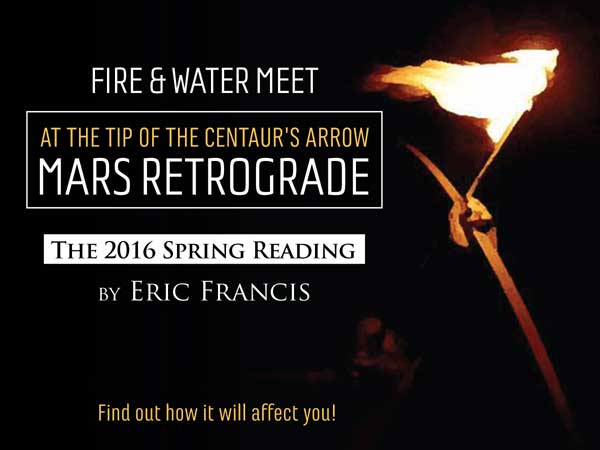
Find out what the Mars retrograde will mean for you in Eric’s 2016 Spring Reading, which we’ll publish in mid-April. You may pre-order all 12 signs here.
The subject matter moved on to discussing the use of magic and ritual when it comes to affecting world events, potentially in ways that are not based in love and “the highest good.” And again, I realized how far I’ve swung to the “love and light” side of the fence.
I understand that the shadow of the New Age movement lies very much in using crystals and bubbles of light as a form of bypassing and avoidance. That is not at all what I mean when I speak of my own basic precept of choosing love first. I’m not afraid of the dark — well, at least not in general — nor has my life been absent of it. My encounters with the dark continually make me more convinced of the importance of coming from a place of love; and the experience of just how integral heart-centered focus is in times of dark comprises the fundamental essence of who I am.
I do not shy away from the Martian/Aries thrust of will, but using it in that kind of magician/sorcerer sense just makes me question whether it is an ethical manipulation, even if it is not overt, and even when wielded with the best of intentions. It also seems to be dancing awfully closely with the potential for overblown ego identification and megalomania, the latter of which are reasons I got out of the Golden Dawn/Western Hermetic tradition after a few months of being initiated — too much mental activity, not enough embodied reality.
Furthermore, my thoughts turned to the Karpman drama triangle, as I realized that playing savior or hero in these ways essentially enmeshes one in the triangle, reinforcing the loop that will ultimately make hero into victim into perpetrator and on and on.
Despite my crystal clarity as to the reasons I am magic-averse, I’m still aware that I’m not a mystic in the radical acceptance or retreat sense. What comes to mind here is my use of shamanic techniques.
When I first started studying Shamanism, I associated it largely with the Scorpio archetype. I still see that in many ways, but I’ve also had a teacher who associates Shamanism with the Virgo-Pisces axis (and perhaps the entire mutable cross). I had a difficult time latching onto that at first. Shamanic themes seemed so inherently Scorpionic to me — going into the underworld, the dark, into dismemberment and regeneration. Scorpio represented what I’d come to know as the healing crisis of the Shaman and their ability to face transformation and death.
As I moved along in my studies, however, I ended up in a workshop where we learned Shamanic extraction techniques. This was, of course, a generic teaching, gleaned from several different cultures, and is not representative of all Shamanism. But one of the basic tenets of that teaching was the importance of merging with a powerful healing ally and dedicating the work to the compassionate healing of the individual involved. Everything was based in that intention of compassion and healing.
That form of Shamanic work seems very Pisces/Compassion-Virgo/Healing to me. As I integrated that new understanding, I began to wonder if perhaps the Scorpio archetype is associated more with the sorcerer than the Shaman. I began to think in terms of Scorpio’s relationship with Mars — representing the desires of the will and the ego — as being a distinctly different form of Shamanism, perhaps one more overtly focused on the individual’s will and specific power dynamics than what I was being taught.
Of course, the Pisces shadow is nothing to mess around with either — it is, after all, associated with the Typhon — a half-human, half-snake monster created by the Titans as a last-ditch effort to prevent the takeover of the Olympians. Pisces is one of those signs whose vast shadow can get overlooked in favor of its capacity for transcendence and ecstasy. Pisces contains the unqualified act of a predator stalking its prey, not because it is evil, but because that is what happens in nature.
This mental meandering does remind me of a basic precept I’ve seen in discussions on Facebook and in personal communiques lately, one which resonates very highly for me — ‘first, do no harm.’ Who am I to say what lessons are being learned in any given dynamic? How am I to know what my limited perspective is missing?
Is it ethical or even loving of me to intervene in another person’s life in a forceful way, even if it’s from behind the scenes? Setting the intention for my magical practice, whatever it looks like, as well as my healing practice to have the ongoing intention of doing no harm seems like solid practice to me.
Where the concept of will is concerned, I spend a lot of time talking about the importance of figuring out and sticking up for one’s own needs and going after what we want — getting out in front of our creations — but what is the best or most effective way to do that?
Once again, I’m left with a bunch of questions that likely do not have cut-and-dried answers. But this week, I feel more aware of the nature of my own path, and I’m happy to add a strongly annunciated “First, do no harm” to my already standard “Just look for love in it.”




